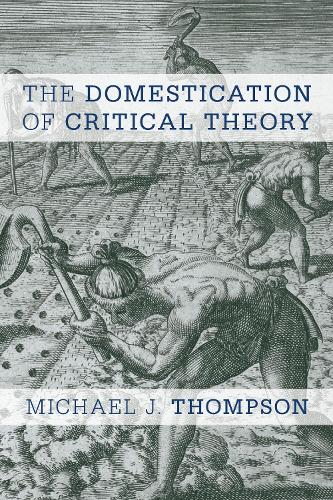
The Domestication of Critical Theory
(Hardback)
Available Formats
Publishing Details
The Domestication of Critical Theory
By (Author) Michael J. Thompson
Bloomsbury Publishing PLC
Rowman & Littlefield International
2nd March 2016
United Kingdom
Classifications
Tertiary Education
Non Fiction
Social and political philosophy
301.01
Physical Properties
Hardback
244
Width 158mm, Height 238mm, Spine 23mm
544g
Description
Critical theory was one of the most vigorous and insightful intellectual traditions of the twentieth-century. At its core was a critique of culture and consciousness tied to instrumental rationality and capitalist economic life. Yet, Michael J. Thompson argues in this highly original book that this once critical tradition has been domesticated - it no longer offers a philosophically convincing nor politically viable form of social critique. Thompson demonstrates that critical theory has surrendered its concerns with domination, alienation, and the pathologies of capitalist modernity and shifted its focus toward neo-Idealist themes. This new critical theory has turned its back on the insights of the classical critical theorists. Thompson traces how this shift occurred and how we can reclaim critique in an age of conformism, apathy, and depoliticization. He goes on to defend the different aspects of critical theory that can be used to reformulate social critique, one that must be brought into a dialogue with contemporary political, social and moral philosophy that protects the lasting and crucial legacy of critical theory as an emancipatory political project.
Reviews
Michael J. Thompsons trenchant critique of the later 20th century linguistic turn in critical theory recovers its Hegelian-Marxian and Weberian roots and revives its critique of capitalism. Thompsons timely, lucidly argued reconstruction of the tradition provides vital analytical resources for illuminating immanent contradictions of the neoliberal regime and envisioning afresh progressive or emancipatory alternatives. -- Robert J. Antonio, Professor of Sociology, The University of Kansas
This is an important book which should be of interest to historians of sociology, social theorists, and critical theorists in particular... In short, The Domestication of Critical Theory is pathbreaking and, more critical theorists should follow that path to find out how far it will take them. * British Journal of Sociology *
Michael Thompsons book is one of the most ambitious criticisms of the prevailing understanding of critical theory... to be read as (a) very good study in the context of traditional Marxism to criticise the later Frankfurt school. * Political Studies Review *
Author Bio
Michael J. Thompson is Professor of Political Science at William Paterson University. He is the author of Radical Intellectuals and the Subversion of Progressive Politics (2015) and the editor of The Palgrave Handbook of Critical Theory (2017) and Hegel's Metaphysics and the Philosophy of Politics (2018).
